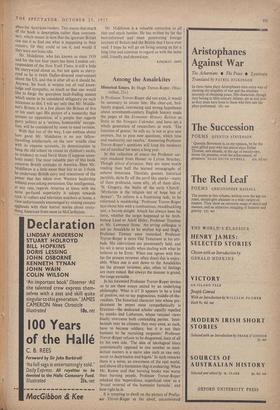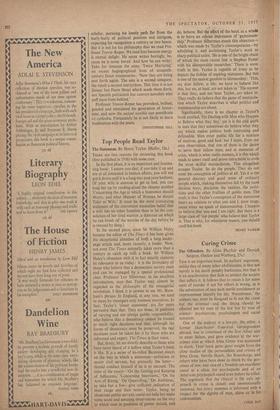Among the Amalekites
IF Professor Trevor-Roper did not exist, it would be necessary to invent him. His clear-cut, bril- liantly argued, convincing and wrong hypotheses about seventeenth-century English history made the pages of the Economic History Review as lively as the Newgate. Calendar, and have set a whole generation of researchers at work. 'The function of genius,' he tells us, 'is not to give new answers, but to pose new questions, which time and mediocrity can resolve.' Answering Professor Trevor-Roper's questions will keep the mediocre out of mischief for many a long year.
In this collection of essays the Professor sur- veys mankind from Homer to Lytton Strachey. Though pieces d' occasion, they are more worth reading than half the learned monographs of soberer historians. Theories, guesses, historical parallels, dicta fly off the anvil like sparks—many of them profound, some silly, all of them alive. 'St. Gregory, the Stalin of the early Church'; 'Mysticism is the religion not of hope but of despair'; 'To reform is a frustrating task; to be reformed is maddening.' Professor Trevor-Roper lays about him with a rumbustious, swashbuckling zest, a boyish delight. Attack has always been his forte, whether the target happened to be Arch- bishop Laud or Adolf Hitler, Professor Toynbee or Mr. Lawrence Stone. 'An erring colleague is not an Amalekite to be smitten hip and thigh,' Professor Tawney once remarked. Professor Trevor-Roper is more Old Testament in his atti- tude. His convictions are passionately held, and his wit is never kindly when dealing with what he believes to be Error. When one agrees with him (as the present reviewer often does) this is enjoy- able. When one is sent down to the Amalekites (as the present reviewer, alas, often is) feelings are more mixed. But always the manner is grand, the range enviable.
In his foreword Professor Trevor-Roper invites us to see these essays united by an underlying philosophy. What is it? It appears to be a kind of positive, not so say pugnacious, middle-of-the- roadism. The historical character into whose pre- dicament he enters most sympathetically is Erasmus—the dedicated scholar equally repelled by monks and Lutherans, whose rational views finally overcame both contending parties. 'Intel- lectuals may be citizens; they may even, as such, have to become soldiers; but it is not their business to be recruiting sergeants.' Professor Trevor-Roper refuses to be dragooned, least of all by his own side. 'The idea of ideological blocs systematically opposed to one another in intel- lectual matters is a naive idea such as can only occur to doctrinaires and bigots.' In such remarks there is a sense, an awareness of the real world, and above all a humanism thq is endearing. When Mr. Rowse said that burning books was worse than burning people, Professor Trevor-Roper rebuked this 'supercilious, superficial view' as a 'brutal reversal of the humanist formula'; and how right he is.
, It is tempting to dwell on the picture of Profes- sor Trevor-Roper as the aloof, uncommitted
scholar, pursuing his lonely path far from the hurly-burly of political passions and intrigues, expecting his recognition a century or two hence. But it is not for his philosophy that we read Pro- fessor Trevor-Roper. We read him because energy is eternal delight. He never writes boringly, be- cause he is never bored. And how he can write! Take for instance the essay 'Twice Martyred,' on recent hagiographical lives of sixteenth- century Jesuit missionaries: 'Now they are being sent forth again. The aim is a second conquest, the result a second martyrdom. This time it is not Douay but Farm Street which sends them forth, not Spanish politicians but convert-novelists who puff them from behind.'
Professor Trevor-Roper has provoked, bullied, goaded and stimulated his generation of histor- ians; and now the enfant terrible can pontificate ex cathedra. Fortunately he is not likely to learn moderation with the years.
CHRISTOPHER HILL



































 Previous page
Previous page